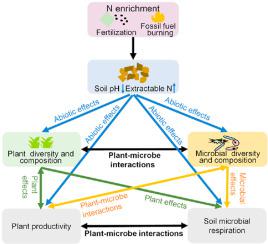Soil Biology and Biochemistry ( IF 9.8 ) Pub Date : 2020-12-03 , DOI: 10.1016/j.soilbio.2020.108107 Fei Yang , Zhilong Zhang , Albert Barberán , Yi Yang , Shuijin Hu , Hui Guo

|
Anthropogenic nitrogen (N) input has overtaken natural N fixation as the leading source of reactive N, and can profoundly alter the structure and functions of terrestrial ecosystems. N input impacts ecosystem functions through altering abiotic (e.g., soil nutrients and pH) and biotic (e.g., biological community composition) properties, but the relative importance of these abiotic and biotic effects remains largely unknown. We conducted a 6-year experiment of N manipulations (0, 5, 10, and 20 g N m−2 yr−1) in a Tibetan alpine meadow to assess N-induced abiotic and biotic effects on ecosystem functions. A complementary experiment with acid additions (0, 0.66, 2.65, 4.63, and 7.28 mol H+ m−2 yr−1) was also carried out to examine the direct impact of acidification. We found that N enrichment significantly increased plant productivity but decreased soil microbial respiration. While the increased productivity was associated with increased N availability, the reduction in soil microbial respiration was mainly explained by the decreased soil pH. In the acid addition experiment, enhanced soil acidity due to the increased proton concentration significantly reduced soil microbial respiration. These results indicate that N-induced changes in soil pH represent an important mechanism driving the ecosystem functions, suggesting that N-induced acidification should receive more attention for understanding and predicting ecosystem services under future N-enrichment scenarios.











































 京公网安备 11010802027423号
京公网安备 11010802027423号